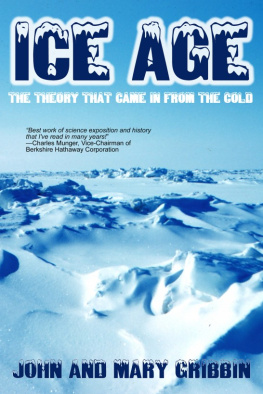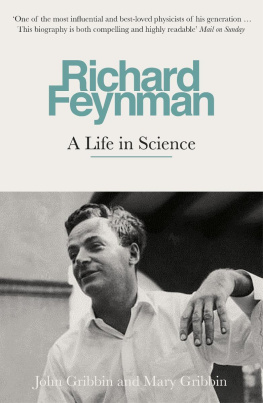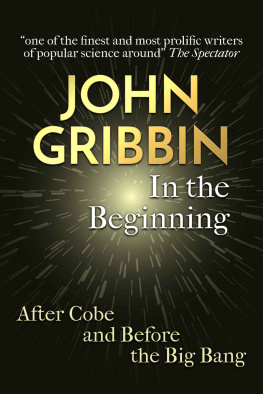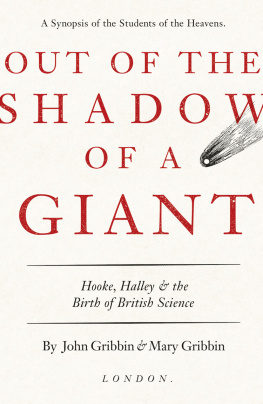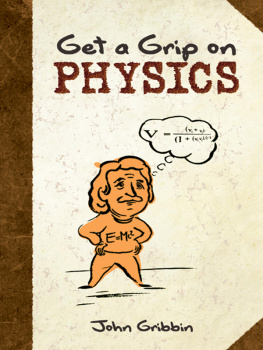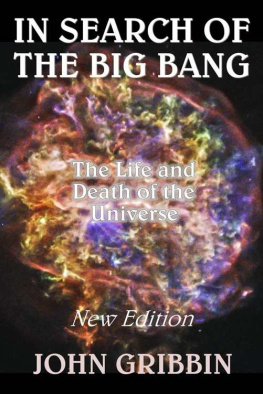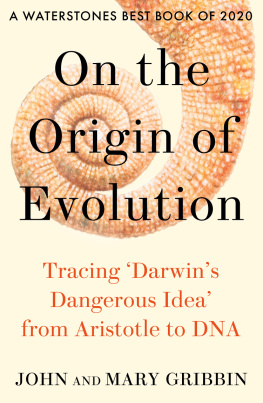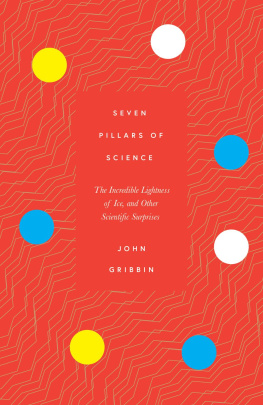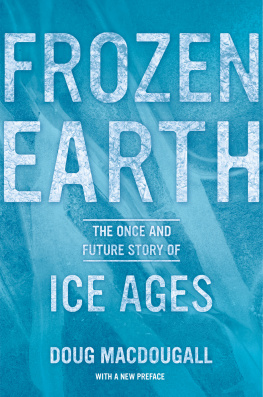ICE AGE
by
JOHN AND MARY GRIBBIN
Produced by ReAnimus Press
Other books by John and Mary Gribbin:
In Search of the Big Bang
Cosmic Coincidences
In Search of the Double Helix
Q is for Quantum
The Sad Happy Story of Aberystwyth theBat
A delightful children's tale by the best-sellingauthor John Gribbin's son Ben
2014, 2001 by John and Mary Gribbin. All rightsreserved.
http://ReAnimus.com/authors/johngribbin
Smashwords Edition Licence Notes
This ebook is licensed for your personal enjoymentonly. This ebook may not be re-sold or given away to other people.If you would like to share this book with another person, pleasepurchase an additional copy for each person. If you're reading thisbook and did not purchase it, or it was not purchased for your useonly, then please purchase your own copy. Thank you for respectingthe hard work of this author.
Table of Contents
A Note on Measurements
The measurements in this book are expressed in themetric and Celsius systems. For the convenience of Americanreaders, the following conversion tables are offered:
Length
1 millimetre = .03937 inches
1 centimetre = .3937 inches
1 metre = 1.0936 yards
Temperature
Fahrenheit = 9/5ths Celsius + 32
e.g., 0C = 32F; 2C = 35F; 6C = 43F; 80C= 176F
Prologue
The Ice Age Now
By the standards of the geological past, we live inan Ice Age. The world has rarely been as cold as it is today. Wedont call it an Ice Age, because not too long ago the world waseven colder than it is todaythat is what we think of as the IceAge. Unless human activities prevent it, the world would soon cool again, back intothe Ice Age proper. Our perspective (the entire history of humancivilization) embraces only a short-lived, temporary retreat of theice, an Interglacial. The succession of relatively long-lived IceAges and relatively short-lived Interglacials is now known as anIce Epoch, and lasts for several million years. It is the story ofthe discovery of the rhythms of the Ice Epoch, and the implicationsfor life on Earth, that we tell here; but even an Ice Epoch is justa passing phase in the lifetime of a planet that has already beenaround for more than four billion years.
v~~~~~~~~~~~~~~~~~~~~~~~~~~~~~~v
The authors are of course well aware of the presenthuman-caused climate change situation, but the reader shouldappreciate this book does not address it for the simple reason thatit is outside the scope of our discussion; this is solely a book onthe history of the scientific discovery of ice ages.
^~~~~~~~~~~~~~~~~~~~~~~~~~~~~~~^
We think that it is normal to have ice at both polesof our planet. After all, there has been ice there for longer thanthere has been human civilization. But in the long history of theEarth, polar ice caps are rare, and having two polar ice caps atthe same time may be unique. Indeed, it may be the presence ofthose polar ice caps which has made us human. And although weassociate weather with the movement of masses of air around theglobe, with high pressure systems bringing settled, dry conditionsand low pressure systems bringing wind and rain or snow, as far asclimate is concerned great ocean currents are much more important.Those currents carry warm water from the equatorial region to thepoles, and the polar regions can only freeze at all if that flow ofwarm water is obstructed. Today, the South Pole is frozen because agreat land mass, Antarctica, lies right over the pole, preventingany ocean currents from reaching it. The conditions around theNorth Pole are almost a mirror image of this, with a nearlylandlocked Arctic Ocean almost surrounded by land masses which makeit difficult for water to flow northward to the pole. But thewarming power of that flow of water away from the equator isnowhere better seen than in northwestern Europe, where the currentknown as the Gulf Stream, which ought to be warming the pole, hasbeen deflected eastward by the bulge of Canada and by Greenland tomake Britain and its neighbourhood some six degrees, Celsius,warmer than it would otherwise be. The simplest way to envisagewhat the climate of northwestern Europe ought to be like is tolook at any globe of the world, and cast your eye due west fromIreland to Canada. Anybody who has experienced a Canadian winteratthe same latitudes as Irelandwould be in little doubt that we areliving in an Ice Age.
Six degrees is a lot of warming. If Greenland werenot in the way, and the Gulf Stream could warm the Arctic by sixdegrees, the thin layer of ice floating on the surface of theArctic Ocean would disappear, changing the climate of the temperateregion of the entire Northern Hemisphere. In fact, just a fractionof the heat carried by the Gulf Stream would be enough to do thejob. The changes resulting from Arctic warming would be bigger thanyou might expect at first sight, and would in many ways beunpredictable, because of the effect of positive feedback. Today,the shiny white surface of the ice covering the Arctic Oceanreflects away incoming solar energy, and helps to keep the polarregion cool. Once the ice starts to melt, however, it exposes darkwater, which absorbs the incoming solar energy and warms the regionstill further. If the world cooled for any reason, the feedbackwould operate in reverse, with dark ocean being covered by shinyice that reflects away incoming solar energy and helps to keepthings cold. If the Arctic icecap were removed, by magic, tomorrow,it would not reform. The world would be quite happy to maintain anice-free Arctic Ocean. Either state is stablewith or without ice.But you cant have half the north polar icecap; the feedbacks makeit an all or nothing choice.
Curiously, this kind of process raises thepossibility that one of the first effects of the global warmingthat is going on at present (which most climatologists explain asbeing at least partly caused by human activities) could be to coolnorthwest Europe. The argument runs like this. The warm waterflowing on the surface of the ocean up the western side of theNorth Atlantic (carrying thirty million cubic metres of water everysecond) is part of a global system of ocean currents which flowsall the way from the tropical Pacific, around South Africas Capeof Good Hope, picking up warmth from the Sun for most of its longjourney. This warm water is less dense than the cold water of thedeeper ocean, which is why it forms a surface current; but it isincreasingly salty, because evaporation carries water away into theair. In the far North Atlantic, where the current is giving up itsheat to the winds which blow from west to east at those latitudes,carrying the warmth towards Europe, the current becomes colder andmore dense. With the added burden of its high salt content, thismakes it sink into the depths, where it returns all the way back toits starting point before welling up again in the North Pacific.The whole system forms a kind of conveyor belt, driven byupside-down convection, pushed by the descending dense, salty waterof the North Atlantic. The flow of this river in the ocean istwenty times greater than the flow of all the rivers on all thecontinents of the Earth put together.
If the Arctic icecap began to melt, though, freshwater would mingle with the surface flow of the Gulf Stream,diluting its saltiness and making it less dense. If this stoppedthe water from sinking, the push that drives the conveyor beltwould be turned off, and the whole flow would stop, with warm waterno longer being carried northward from Panama past Florida and upthe North Atlantic. The whole flow could even reverse, with Europecooling to the temperatures typical of Vancouver, and Vancouverenjoying the kind of climate now found in Ireland. If this claimseems over the top, consider that the rate at which heat is beingtransported northward by the Gulf Stream today is more than amillion billion watts, as if the current were a real conveyor beltcovered with a million million one-bar electric fires, all pouringtheir heat out into the atmosphere. And that is the only reason whyit isnt obvious to everyone in Britain, and the rest of northwestEurope, that we are living in an Ice Age now.

